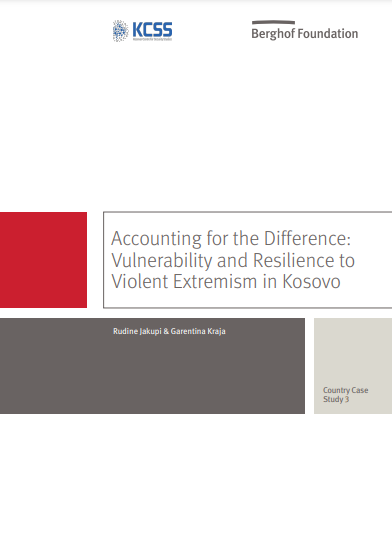24/10/2018

Kosovar Center for Security Studies (KCSS); Berghof Foundation
German Federal Foreign Office
Rudinë Jakupi & Garentina Kraja
This report is a qualitative study that sets out to understand and contextualise the community-level dynamics in areas that were either affected or unaffected by violent extremism in Kosovo in the course of the last six years. So far, most of the research into violent extremism conducted in the Western Balkans builds upon the push and pull factors (UNDP 2017c) that have incentivised dozens of individuals across the region to join terrorist organisations in the Middle East, primarily in Syria and Iraq. Both countries are experiencing protracted civil war and political unrest that have turned them into symbols of ideological battlegrounds of the early 21st century.
In this study, researchers explore the in-country dynamics that may have encouraged or prevented violent extremism in a particular setting. The change of scope from individual factors to communitybased actors and factors that determine the path to radicalisation is likely to provide policymakers with urgent answers on targeted interventions that would address structural weaknesses and bolster particular strengths that may make communities at best resistant, or at the very least, better equipped to deal with future threats to their security. Hence, the goal of this research is to identify the factors that make communities vulnerable or resilient, and to try to gauge, through a plethora of actors, the impact of such factors on the prevention of violent extremism. The remainder of this report will discuss the research design and terminology adopted for the purpose of this research (Section 2), the country background (Section 3), the key findings on factors and actors influencing community resilience or vulnerability to violent extremism (Section 4), an assessment of PVE programmes as well as their potential linkages with peacebuilding initiatives (Section 5), and finally some concluding observations and recommendations (Section 6).
This country case study on Kosovo was produced, alongside three others covering Albania, Bosnia-Hercegovina and Macedonia, in the framework of a participatory research project on “Opportunities for Preventing Violent Extremism in the Western Balkans”. Together with with four local research partners, we explore why some communities are particularly affected by individuals inspired by and/or joining the Islamic State (IS) or other similar violent extremist groups, while other communities may show greater resilience to the same phenomenon. Based on the research findings, the project partners will conduct policy outreach and local dialogue initiatives, in cooperation with local stakeholders and affected communities, in order to explore and develop strategies to prevent violent radicalisation in the Western Balkans.
The project and its reports were made possible by funding from the German Federal Foreign Office.